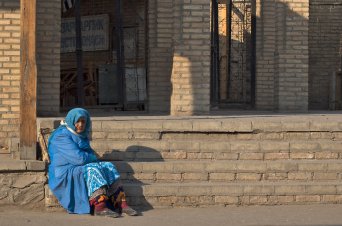- About
- Topics
- Picks
- Audio
- Story
- In-Depth
- Opinion
- News
- Donate
- Signup for our newsletterOur Editors' Best Picks.Send
Read, Debate: Engage.
| topic: | Poverty |
|---|---|
| located: | Ukraine, Russia, Kyrgyzstan, Uzbekistan, Tajikistan |
| editor: | Katarzyna Rybarczyk |
In response to the Russian invasion of Ukraine, the West has imposed sanctions on Russia that have led to hundreds of companies halting operations in the country and to a subsequent weakening of the Russian economy. Although the goal of these measures is to place pressure on the Kremlin and discourage it from continuing its military operation, the economic downturn in Russia has had a spillover effect on remittance-dependent Central Asian countries.
Due to cultural similarity and socio-economic ties formed during the Soviet era, for decades Russia has been a major destination for labour migrants from Central Asia, especially from Uzbekistan, Tajikistan and Kyrgyzstan. Official figures show that almost five million labourers from these three countries work in Russia, but the actual numbers, which also take into consideration individuals working in the informal economy, may be even higher.
With employment opportunities in their home communities being limited to seasonal farm work, most of these workers regularly transfer money to their families in their home countries. The International Organization For Migration (IOM) reported that remittances from Russia account for between 11 to 31 percent of the gross domestic product of Central Asian states. But as the Western sanctions have had a severe impact on the Russian labour market, many migrant labourers have lost their jobs or have had their wages reduced. Their decreased employment hinders their ability to send remittances, which, as noted by Renate Held from IOM’s Vienna Regional Office “will certainly have a detrimental impact on the region’s economies.”
Most Central Asian workers in Russia come from poverty-ridden rural areas, so the money they send home augments the income of recipient households. For this reason, remittances play a crucial role in poverty alleviation. In Kyrgyzstan, for example, remittances reduced the national poverty rate by 11 percentage points in 2019.
Since money received from abroad is typically used to fulfil families’ basic needs, such as food or healthcare, disruptions of remittance flows can lead to increased levels of extreme poverty among labour migrants’ families in Central Asia. For the most vulnerable households, losing remittances translates to losing an important financing lifeline.
“A decline in remittances from Russia could push an additional one million people into poverty in the region,” observed the IMF. High inflation and increases to food and energy prices - all of which have also been implications of the war - risk further exacerbating the situation, especially as families that rely on remittances rarely have any savings.
Apart from depriving families of the ability to cover their immediate needs, the reduction in or a complete cessation of remittances, coupled with soaring prices, can lead to “a steep rise in school dropouts and infant mortality,” UNICEF pointed out.
To prevent poverty levels from rising, thereby pushing families into serious financial distress, the international community must monitor remittance flows and intervene when there are significant decreases. Additionally, policymakers should introduce targeted support and livelihood assistance for affected families. The absence of such measures risks reversing the progress in reducing poverty that post-Soviet states have achieved over the last three decades.
Photo by Joel Heard

